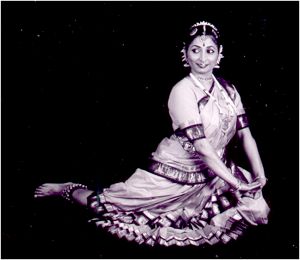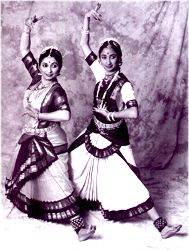
|
 |

|
 |
MALATHI IYENGAR - Lalitha Venkat e-mail: lalvenkat@yahoo.com Dec 2000  Malathi Iyengar, originally from Bangalore, India is a Los Angeles based choreographer, dancer and a visual artist. Malathi studied the vintage 'Pandanallur' style of 'Bharata Natyam' from the renowned guru Narmada of Bangalore. Her dance training includes earning a Master of Fine Arts Degree in Choreography from University of California, Los Angeles. She studied choreography under the mentorship of Marion Scott. Malathi has won several awards, fellowships for her traditional and intercultural choreographic works and presentations, including 'The Alma Hawkins Award for Excellence in Choreography', 'Brody Fellowship for Performing Arts', and from 'The National Endowment for the Arts for Creation & Presentation'. Malathi Iyengar is the artistic director of Rangoli Foundation for Art & Culture. There are so many Indian classical dancers in the California area. How are you able to hold your own? It is an ongoing process of evaluating my purpose and duty in the arts and community. I have to work at it on an almost everyday basis. In order to answer this question, I have to give you my background. I come from a family of musicians, dramatists and visual artists. Our family including my father, Venkatachalan a violinist, my mother, Sharada, a Gamaka and drama artist, and my brother, Sudarshan, a musician were completely involved in the arts even in India. I pursued many of the artistic activities including doing a lot of 'Rangoli work' for festivals, Ramanavami celebrations, and art exhibits. Dance was not accessible where we lived, though my mother very much wanted me to learn. She would occasionally teach me a few dances that she had learnt from her Bharata Natyam dancer friend. We lived in a village 12 miles away from Bangalore city and opportunities and monetary reasons prevented me from getting dance lessons. I married Suresh Iyengar, a practicing dentist in Los Angeles at the age of nineteen and moved to LA. He is a very good sculptor and a visual artist. After Lakshmi was born, she showed an enormous potential for music and dance. I opened Rangoli Foundation in 1985 and shared some of my own artistic works, organized concerts, and showcased other artists as well. Lakshmi and I together started to learn Bharata Natyam. I decided to learn at the age of 33, as I thought this would help me gain knowledge in Indian music and dance, and also help Lakshmi keep up the practice. Little did I know that it would become such a serious artistic activity in my life. I did my very best to travel to India regularly, and also sponsored my teacher guru Narmada several times to come and teach us. The learning was intensive, sometimes even 6 - 8 hours a day. Both of us did our Arangetrams under the guidance of guru Narmada. In 1993, I went on to pursue Master of Fine Arts in Choreography at UCLA. This helped me develop another eye and thinking ability for choreography. Ever since, I have been choreographing both traditional and intercultural works, and have showed them in India and United States extensively. In 1997, I conducted my student, Shaheen's Arangetram and this became a milestone in Los Angeles community as Shaheen coming from Indian Muslim background performed the solo dancing beautifully for an audience of over 500 people. I have sponsored male dancers and musicians from India every year for the past 10 years to work with us. I have 5 - 6 well-trained core company dancers who work on all our projects. I have received very favorable responses from audiences for my works and I have a good following. I have to constantly remind myself that I am growing artistically in my own time and serving a certain community that is appreciative and supportive. I am finding a personal joy, and am fulfilling a purpose of sharing our culture with my students and audiences. I am happy for receiving good technique and material, and I have maintained it well. I constantly educate myself to be better and am open to learning. I like to live and let live. I seek personal and spiritual satisfaction by widening my circle and visions. Perhaps these convictions help me hold my place.  As an Indian classical dancer based in the USA, which is more important to you? Credibility in India or in the USA? They both are important as they provide different forum, experiences and rewards. In several large cities in US, both Indian and mainstream audiences are well exposed to good dancing and expect the very best. This is because of many dancers striving for quality, professionalism and traditional values. In India, depending upon the venue of our performances and audiences, it could provide immense satisfaction, legitimacy and firm grounding. Do funding bodies in US prefer "new experimental work" to promote, rather than traditional repertoire? I have been a dance Panelist for the past three years and have sat on several other panels and award committees regarding these issues. In my experience, traditional dance has a lot of strength in USA. I am aware that in countries like Canada and England, lot of contemporary and experimental work goes on, and the funding bodies are accustomed to this. However I see the need and push for choreographing experimental works more in a University setting in US, than among the practitioners in the community. Remembering my time at UCLA, I was always very encouraged and sometimes even pushed to a certain extent to do new work or experimental work. It was always a challenge to see how new and how experimental can I possibly get, and still stay within the self imposed boundaries. This is because of my own personal choice of concepts, visual aesthetics, and movement expression. I do some intercultural work, as I enjoy the process of discovering new possibilities, and the interaction between other artists of diverse cultures. The funding agencies and panelists in Los Angeles are aware of good traditional dancing and are appreciative of that. Very few artists are trying to do new or experimental choreographic works here. Even when it is attempted, it appears to be traditional for the academic world. There are one or two dancers who have attempted some contemporary choreography. The mainstream audiences have a lot of reverence for good classical work in US. Are dancers under increasing pressure nowadays to move away from classical forms? No. Not that much in USA. It all depends upon the individual dancer's personal choices, strength and convictions. What is the status of Indian Classical Dance in American society today? I think it is at a very exciting level. Many young dancers have been trained well by several good teachers. Indian dance is very much alive and vibrant. Of course, like in any other society, there is a wide range of dancing going on from very ordinary to very good. What are the developments that Indian Classical Dance has undergone in the US? Emphasis on tenacity, quality and culture has increased. This is because there is good competition among artists to strive for the better. In the process, the mainstream and Indian audiences have alternate choices. There is an opportunity to discern from mediocre to good. Are you working in any new forthcoming project now? Yes. It is untitled. I have been working on the concept since Nov 1999 and hope to stage it in 2001, if possible. I have been choreographing new works since 1992. They are completely different from each other in concept, music and choreography. I take anywhere from one year to two years to develop and stage each new work. I have created both traditional and contemporary, full-length works and several individual dances. Your Birth Date. March 31st 1954. Now the whole world knows it!! Most memorable event in your career. My Arangetram at the age of 38, and my daughter, Lakshmi's Arangetram at the age of 11. Most memorable dance performance you have seen. Guru Kelucharan Mohopatra's Ashtapadi, 'Pashyati Dishi Dishi' My Guru Narmada dancing Useni Swarajathi with complete abandon during one of our recording sessions. Malathi Iyengar "Rangoli Foundation for Art & Culture" 14748, Morrison St Sherman Oaks, CA 91403 Ph: (818) - 788-6860 Fax: (818) - 990-9279 e-mail: msiyengar@hotmail.com msiyengar@rangoli.org |